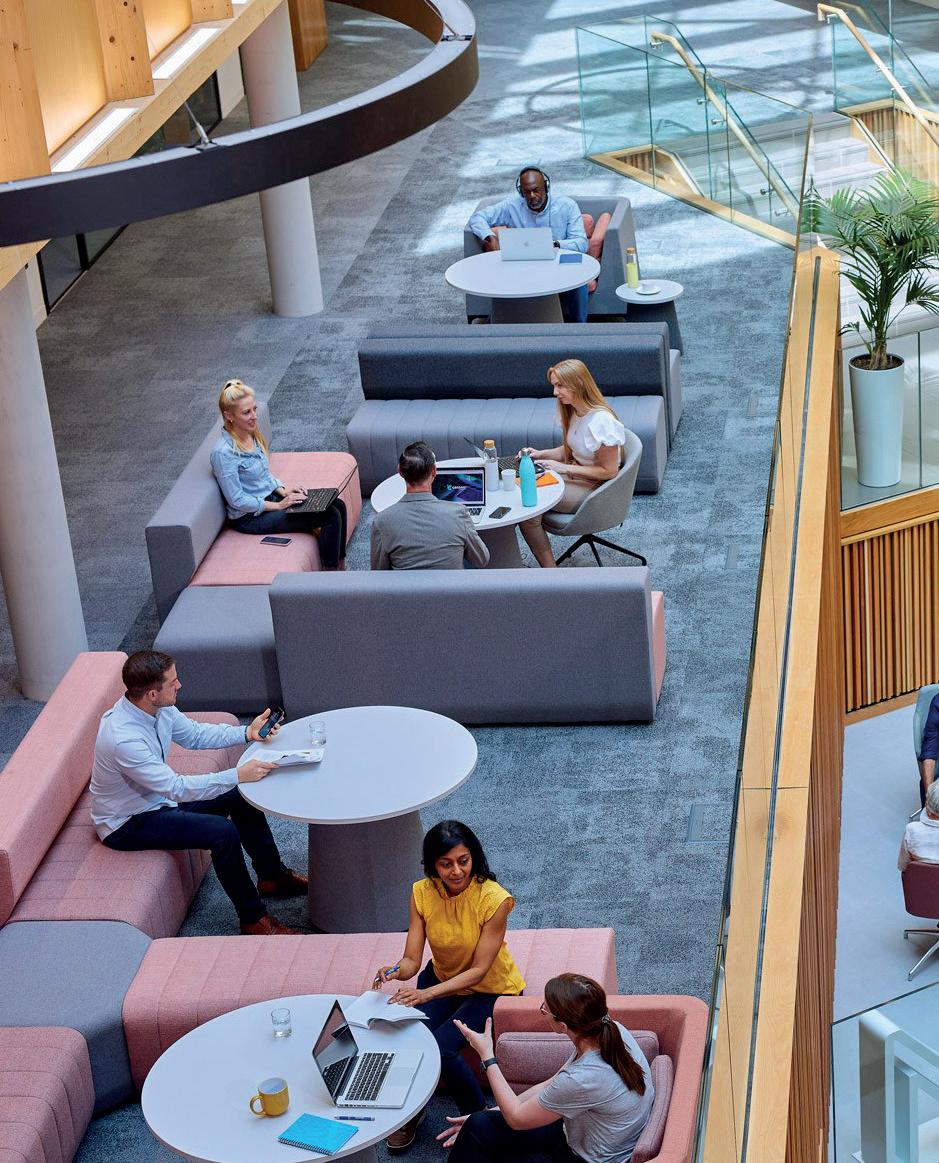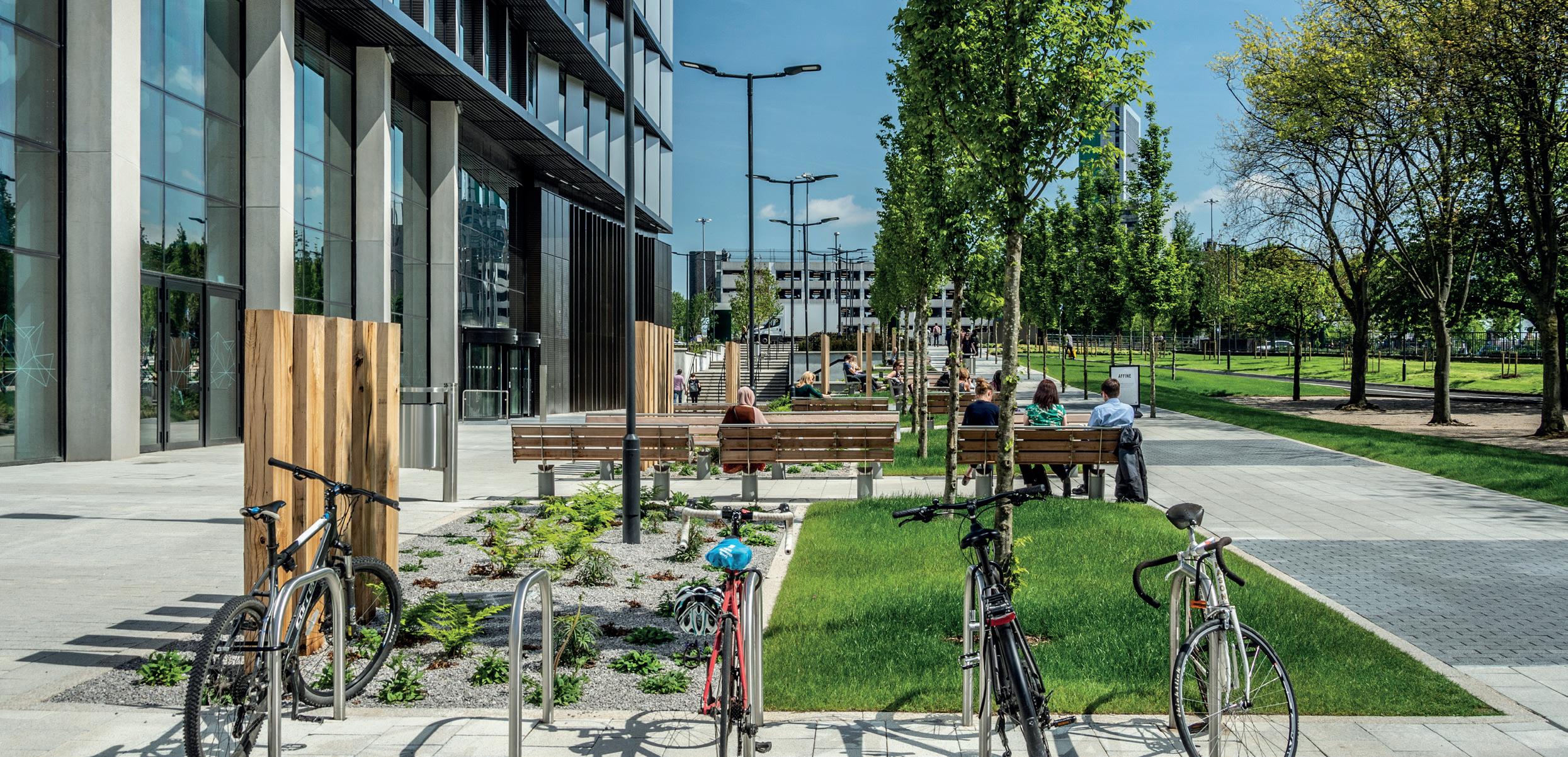
6 minute read
PROFILE
28 PROFILE
Innovate & communicate
Advertisement
Innovation communities are more important than ever says Dr Martin Stow, Director of University of Leeds’ innovation hub Nexus

Innovation has become ever more critical to unlocking post-pandemic growth for our region and techenabled hubs and business communities, which are specifically designed to foster innovation and connectivity, have a vital role to play. Attracting the entrepreneurs, companies and investors which will generate a beneficial economic and societal impact – locally, nationally and internationally – these communities are a powerful magnet for collaboration, bringing together the brightest minds and most inspiring business concepts. The benefits of those innovation-led communities can be measured economically – through capital investment and skilled jobs created, for example – and on a societal level, with increased connections, collaboration and improved social mobility At Nexus we continue to be inspired by the vision and creativity of our member businesses as they develop new ideas, scale fast and generate products and services which deliver real impact. We’ve been privileged to host and support them since our launch in 2019 and our focus has always been to create a thriving community, rich in opportunity. This helped us to provide real continuity for our members and the community continued to expand through lockdown and now has 59 members.
30 PROFILE
The many challenges posed by the pandemic often became an accelerator for innovation as the Nexus community used creative problem-solving either to pivot or rapidly grow their businesses. Itecho Health, for example, developed a dedicated healthcare platform, Ascelus, for patients with long-term health conditions, enabling them to connect with their clinicians via their smartphones and devices and freeing up vital clinician time for face-to-face appointments with patients who have more complex needs. During the pandemic they increased from an initial two to now cover numerous disease areas, supported by medical student placements, whilst continuing to grow their team. Crowded – whose core business is monitoring people movement and behaviour to inform planning decisions – obviously faced a particular problem during lockdown as people stayed at home. Their data analytics team refocused on public health and safety when using crossings and other points of public access, developing CrowdedCROSS™ which offers pedestrians using a smart device a COVID-safe, contactless experience. We know from our members that innovation ecosystems and the investment they attract are a major draw for international companies seeking to work with leading academics and optimise their innovation. Betalin Therapeutics, biotechnology specialists based in Israel, chose Nexus as its UK base to develop revolutionary treatment for diabetes, supported by funding from the Leeds City Region Enterprise Partnership. We are also delighted to see the continued international expansion of Ligentia, who relocated its software development division from Asia last year, to join our business community. The global supply chain management provider, which works with leading retailers, consumer brands and healthcare providers, has tripled its space at Nexus recently and is targeting growth to reach £1 billion revenue in the next four years. The strength of our region’s talent proposition was a major reason behind Snowflake’s decision to join us. The US cloud-based software multinational has a major recruitment focus on software engineers and saw great potential in our available talent pool. The connectivity of Leeds and the wider region was cited as key to Vastmindz locating to Nexus. The digital health experts who specialise in AIpowered insights for well-being, said things could be achieved at least twice as quickly here, because the support networks and contacts were in place. And Videregen, leaders in the development of personalised, regenerative products to replace, repair and restore organs and tissues, moved from Cambridge to join us, because of the dedicated laboratory space which is available and the benefits of being part of a smaller, but faster-growing innovation community. Innovation is very much a ‘contact sport’ –the more diverse the people and the experiences, perspectives and technologies they bring, the newer and more creative the thinking: allowing entrepreneurs to think beyond traditional solutions. That is where innovation communities play a fundamental role. We facilitate curated collaboration – our latest Innovation Cluster Challenges Workshop, for example, in partnership with KPMG, attracted over 40 entrepreneurs, businesses, funding providers and advisers. Our strategic partnership with KPMG continues to expand with the introduction of an incubation space for qualifying startups as well as a number of other initiatives around Exec Education/CPD, placement/internships and research collaborations to support their clients, We also enable spontaneous, random connections - those vital “water cooler” moments. This was one of many clear benefits to businesses from working with innovation communities such as Nexus identified in a survey we commissioned earlier this year in partnership with CBI Economics.


The resulting Revolution of Work report analysed the feedback of over 300 businesses across the UK, on the impact of the pandemic on companies’ workspace preferences, ways of working, innovation and collaboration. It clearly showed that whilst UK businesses are planning to embrace hybrid working in the long term, there is still a place for office space and UK businesses have a clear vision about the way offices will be used in the future: as a focus for team-building and strategy days and vital innovation planning. Half the companies surveyed felt that remote and hybrid working had made it harder to be innovative, with a majority observing a negative impact on creative planning sessions when ideas are shared and new relationships formed, which can be the key to network expansion and business growth. UK business owners will be even more focused on the social and networking benefits of future office space and will prioritise workplaces, which are designed to create the best environments to deliver collaborative working and shared ideas. Remote working has enabled workers to more flexibly manage their work, but it has made innovation more challenging. Commercialising that innovation is obviously a critical factor for businesses and the growth of our economy and this again puts innovation hubs and the wider innovation ecosystems we’re part of, at the centre of optimising opportunities, catalysing collaboration and enabling businesses to scale fast, deliver real impact and grow. Communities like Nexus are specifically designed to cater for high growth businesses, whether start-up, scale-up or larger. A culture of creativity, collaboration and community is at our core and central to the wider networks we create and nurture. We’re proud to be able to say that over half of our member businesses at Nexus are currently exploring opportunities to innovate with each other, illustrating the power of a close-knit community. Developed and connected innovation ecosystems are essential in that process and to help businesses capitalise on the very best support available. That could be advice from seasoned entrepreneurs on the best way to acquire and retain customers, or working with partner organisations on research and development. It could also be about access to the right skills and talent, or tapping into a rich and abundant start-up support community. Working with universities and their innovation hubs can open up major opportunities for early-stage businesses to partner with world-leading experts. Academics are intrinsically motivated by curiosity and a passion for new discoveries; they want to uncover hidden value, solve problems that benefit society and are driven to be the best in their field. Through effective collaboration with those brilliant minds you can enhance your technology, build new products, re-engineer a production process or get the latest insights on marketing and management science. Universities are powerhouses of innovation and academics are able to work flexibly with you, on collaborations and as consultants, building long-lasting relationships to maximise value. The complexity of the emerging needs and challenges of society today, demand cross-disciplinary thinking and the future of technology and innovation will be led by collaborative communities. Our region is incredibly well placed to take a lead in this sphere, delivering growth and increasing our competitiveness on the global stage. Innovation-led communities are a catalyst for creativity, collaboration and community. As we enter a postpandemic recovery period, their role has never been more important.









